Elections Alberta
 | |
| Agency overview | |
|---|---|
| Formed | 1977 |
| Jurisdiction | Provincial Elections in Alberta |
| Headquarters | Suite 100, 11510 Kingsway, Edmonton, Alberta |
| Annual budget | $ 2,515,000 [1] |
| Agency executive | Glen Resler, Chief Electoral Officer |
| Website | EAB Homepage |
Elections Alberta is the non-partisan organization which oversees general elections and by-elections for the Legislative Assembly of Alberta. Elections Alberta also oversees Senatorial elections and plebiscites.
History
Elections Alberta was created in 1977 to act as an independent body to oversee Alberta's elections. Prior to 1977 returning officers were appointed to oversee each election. Elections Alberta oversees the creation of riding associations, compiles election statistics on ridings, collects financial statements from party candidates and riding associations, and the creation of new political parties. It maintains a list of electors, through enumeration that occurs from six months before an election. Elections Alberta is also responsible for enacting legislation relating to elections passed in the Legislative Assembly, including Electoral boundary changes and Elections finance laws.
After an election, the voters list of who voted is allowed to be viewed at the elections Alberta office or purchased for 30 days after election day for a nominal charge. When a candidate riding association or party files a financial statement in Alberta he or she must keep records and receipts for at least three years, as they can be subject to audit in that period. Financial statements are also archived at public libraries in Alberta.
Services
Elections Alberta is tasked with printing and distributing maps and Elections Alberta related campaign materials and guides to candidates and party officials. It is mandated to issue an annual report every year, as well as reports after each election. These reports contain new and deregistered riding associations, contributions given to parties, changes to electors data. Party executives and contact information. Cost of elections in each riding, names of returning officers and anything else relevant to the election.
Electoral boundaries commission
Electoral boundary changes come from the Alberta Electoral Boundaries Commission made up of five appointed members, who go and collect input from local residents, politicians and draw up the divisions based on enumeration and census data. A bill is then introduced and voted on in the Legislative Assembly. Minor changes may be made and introduced by members. Changes are then enacted by the chief electoral officer.
An expansion from 83 to 87 ridings was recommended by the commission in June, 2010 and their report with the new riding boundaries will first be in effect for the April 2012 general election.
Fees and expenses
In 1905, the nomination deposit was set at $100, a figure that was well beyond the means of ordinary citizens at the time. Despite inflation, this fee was not changed until 1992 when it was doubled to $200, thus remaining a nominal sum to many Albertans. In 2004, the government controversially increased the required deposit again, to $500, although it became easier to get half of the new deposit back. The government contended that the increase was necessary to deter frivolous candidacies, encourage timely filing of financial statements, and help pay for Elections Alberta's expenses. Some smaller parties argue that an excessively high deposit represents an unacceptable "user fee" on democracy.
Prior to the 2004 general election a candidate received his or her deposit back if he or she was elected or receives at least one half the votes of the elected candidate. Candidates who failed to meet these benchmarks forfeited their deposits. Starting with the 2004 election however, the refund policy described above only applies to half of the new deposit ($250). The other half of the deposit is refunded if the candidate files the required financial statements with Elections Alberta within the prescribed time frame, regardless of how many votes he or she receives. Therefore, a failed candidate who files timely financial statements would lose $250. A change in legislation in 2010 led to the deposit being fully refundable to candidates who file their post-election financial report on time.
A nomination deposit for a senatorial candidate costs $4000. The reason for this relatively hefty sum is that the Constitution of Canada requires senators to own $4000 worth of property. The practice of electing senators has been criticized as frivolous because under the Constitution senators are appointed by the Prime Minister of Canada, and only two people elected as a senator, Stan Waters and Bert Brown, have ever been appointed to the Senate of Canada.
Elections Alberta reported $6,844,686 in expenses for the 2004 general election.
List of chief electoral officers
- Glen Resler (current)
- O. Brian Fjeldheim (December 2009 - April 2013)
- Lorne R. Gibson (June 2006 - March 2009)
- O. Brian Fjeldheim (October 1998 - November 2005)
- Dermot F. Whelan (September 1994 - March 1998)
- Patrick D. Ledgerwood (August 1985 - June 1994)
- Kenneth A. Wark (September 1977 - August 1985)
See also
- List of Alberta general elections
- List of Alberta plebiscites
- List of Alberta senatorial elections
- Alberta general election, 2004
- Alberta provincial electoral districts
References
External links
- Elections Alberta
- Alberta Legislature
- Election Finances and Contributions Disclosure Act
- Election Act
| ||||||||||||||